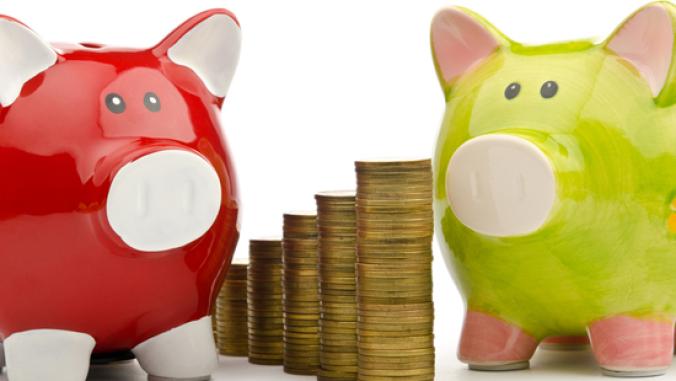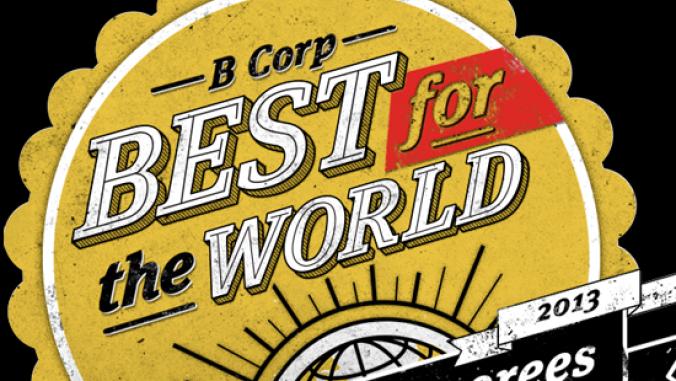ICYMI: Nanoparticles in donuts and the world's greenest drugstore
<p>This weekly roundup of news you may have missed trawls the aisles for interesting reports, corporate commitments and goals ... and nanofood.</p>

ICYMI -- "In Case You Missed It" -- is a regular Friday feature recapping the news of the week.
Welcome to all you New York Times Green blog refugees! We've been waiting for you ever since the paper of record unceremoniously dumped its blog (soon after dismantling its environmental reporting desk). Enjoy, and as always, let us know what you think!
New Reports and Notable Rankings
• For almost as long as GreenBiz.com has existed, we've asked the question: Are insurance companies preparing for the additional risks and expenditures that climate change will bring? The answer has been reliably "no." And a new report from Ceres provides the details behind that no: "Of 184 companies surveyed, only 23 had such strategies, and 13 of those that did were foreign-owned," according to Wendy Koch in USA Today. Koch also notes that "[t]he report comes as weather-related disasters cost an estimated $100 billion in damages last year".
• This just in: this morning, the Retail Industry Leaders Association (RILA) released its second annual Retail Sustainability Report, detailing the sustainability initiatives that RILA's 200-plus member companies have adopted. The report lays out six trends in retail sustainability, including:
- Sustainability teams are growing
- Sustainability investment payback requirements are two to three years.
- Breadth of sustainability activities are increasing.
- Tracking of sustainability metrics will grow in prevalence.
- Most retailers measure energy, fuel, material usage, and waste generation
- Three key stakeholders are applying pressure.
- There are identifiable attributes of top performing companies.
• A new report from BSR finds that 35 companies now publicly discuss the value of ecosystem services, and are taking more seriously the issue of measuring the benefits provided by and impacts they have on the environments in which they work. Writing in BSR's blog, Sissel Waage identifies four trends from the report:
- A business case for action on ecosystem services is emerging within some industries.
- Corporate applications of ecosystem services concepts span the gamut of business decision types -- from governance to strategy to operations.
- Moving from ecosystem services concepts to action remains a challenge, due to relatively little publicly available information on corporate testing of effective approaches and tools.
- Many corporate managers' preliminary conclusions about ecosystem services assessments are that they generate insights, particularly around business dependencies that may be at risk within a changing climate.
• Can you put a dollar amount on the low-carbon economy? If you're Ethical Markets, the answer is yes, and that dollar amount is the exceedingly specific $4,125,290,128,273 -- that's $4.13 trillion dollars in private investments in the cleaner, greener technologies since 2007. This week Ethical Markets released its latest Green Transition Scoreboard, which outlines an inflection point in the shift to low-carbon technologies: Renewable energy, green construction, energy efficiency, cleantech and investments in green R&D. This year's report continues a steady, rapid progression in the green transition: In 2010, the scoreboard showed $1.6 trillion, in 2011 it climbed to $2.005 trillion, and in 2012 it reached $3.3 trillion. That is rapid, promising progress.
Case in point: This week, Deutsche Bank announced that its research shows that the global solar market has already achieved grid parity in India and Italy with the global solar industry being able to generate renewable energy at the same cost as coal and other carbon-powered fuel sources by 2014.
Commitments, Goals & Achievements
• In 2008, FedEx set what seemed at the time to be a radically ambitious goal: To reduce the emissions of its entire fleet by 20 percent over 2005 levels before 2020. It turns out that wasn't nearly radical enough: Not only did FedEx just announce that it had surpassed its goal eight years early, but that it will now aim for 30 percent improvement by 2020.
• Walmart has achieved its emissions-reductions goal a year early: As of this week, the retail behemoth's carbon footprint is 20.02 percent below its 2005 baseline, although its overall emissions have grown as the company expands globally.
• Volkswagen has become the first auto company to set hard targets for emissions, with a goal of 95 grams of carbon per kilometer traveled by 2020. The announcement came during the Geneva Auto Show, when VW also unveiled its e-Co-Motion concept vehicle, an electric city delivery van that promises a driving range of up to 200km (124 miles) and a top speed of 120km/hour (74 mph).
• Walgreens wants to make the ubiquitous urban drugstore -- part medicine cabinet, part convenience store, part last-minute-errand-hotspot -- significantly greener. The company this week announced plans to build the first net-zero energy retail store, by using green building practices in conjunction with more than 800 solar panels, two wind turbines and geothermal energy to generate as much energy as it uses. It's like a one-stop shop for renewable energy!
• McDonald's announced that it is investing $6.5 million to help about 13,000 farmers in central America farm coffee in more sustainable ways.
• Paper manufacturer Avery Dennison this week announced that it had created a company-wide policy on responsible paper procurement, in partnership with the Rainforest Alliance. Unfortunately, there are few specifics and no targets in the policy, it is something of a starting point.
• Speaking of starting points, Asia Pulp & Paper has long been vocal about its efforts to improve its sustainability footprint -- just not nearly as vocal as its critics, who have claimed even longer that APP was one of the world's worst actors in deforestation. But this week, one of those critics published an essay that asks the question "is Asia Pulp & Paper finally embracing sustainable practice?" Brendan May also hopes to be able to answer the question: His firm, the Robertsbridge Group, is now working with APP to help them achieve real and long-lasting sustainability goals.
Greener Data Centers
A long long time ago my beat at GreenBiz was green IT -- I was all data centers and pc power management software, all the time. Although those days are passed, I still keenly follow green IT developments, and this week brought three notable items:
• The Green Grid has proposed its newest green data center metric, to go alongside PUE, DCEP and WUE: Electronics Disposal Efficiency, or EDE. The new metric is aimed at determining just how responsibly you are disposing of unwanted IT assets, by measuring the percentage of all waste disposed that is responsibly disposed, where "responsible" disposal means delivered to a recycler certified under the RIOS, R2 or eStewards standards.
• Speaking of the Green Grid, the organization held its annual forum this week in Santa Clara, and one of the keynote presentations came from Google's Joe Kava, VP of data centers. Ucilia Wang at GigaOm sums up his presentation with "10 rules for designing data centers."
• eBay has published a complicated-looking dashboard that the company says displays the "miles per gallon" for a data center. The dashboard displays the CO2 emissions, energy use, cost and revenue from every single transaction made through eBay in 2012, broken out by quarter or for the year as a whole. (And, because we're clearly on a Green Grid kick, eBay's dashboard also shows three Green Grid-created metrics front-and-center, with a PUE of 1.57, a WUE of 2.43, and a CUE of 1.01.)
Nanofood.
• This is the kind of vague, free-floating-anxiety-inducing kind of creepy news that you just don't want to end your week (or your weekly column) on, but alas: As You Sow is in the midst of a fundraising campaign to test foods for nanotechnology ingredients; according to report they released earlier this year, "The food industry is exploring using nano because of its potential to do revolutionary things to our foods, like make creamy fat-free liquids, enhance flavors, brighten colors, and keep food fresh longer." As You Sow has apparently found nano-particles in the powdered sugar on Dunkin' Donuts, and now they're raising money to test Pop Tarts and Betty Crocker Whipped Frosting for the same materials.
Until next week, um, happy snacking?
Shipping truck photo by Natalia Bratslavsky via Shutterstock.





